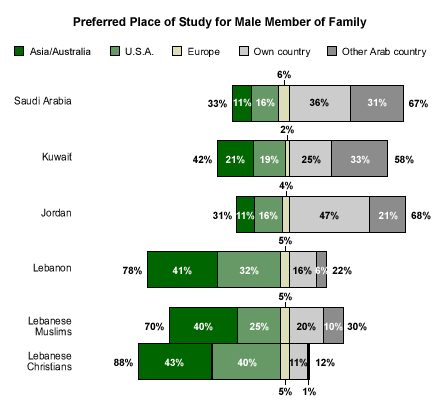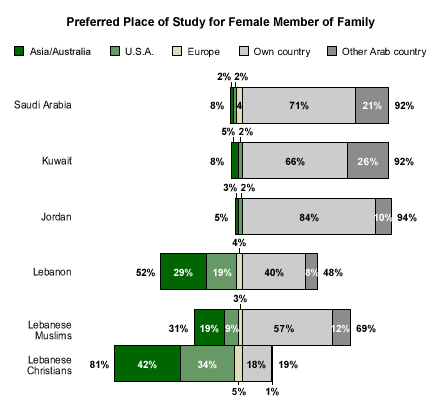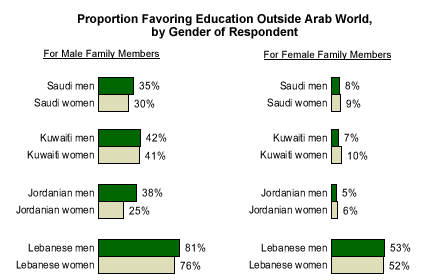Despite their predominantly unfavorable perceptions of the United States, many Arabs interviewed in the 2002 Gallup Poll of the Islamic World continue to regard the West -- and even the United States -- as the most attractive option for higher education.
Arab nations sent 23,000 students to the United States in academic year 2000-2001, according to Institute for International Education data. While requests for U.S. student (F1) visas declined in the wake of Sept. 11, 2001, the numbers are still sizable. For example, excluding those classified as "guest workers," Kuwait has just 882,000 citizens, yet there are more than 3,000 Kuwaiti students enrolled in American colleges and universities -- roughly 2% of the country's total college-age citizenry.
Sizable proportions of Kuwaitis (42%), Saudis (33%) and Jordanians (31%) say they would choose, if possible, to educate their sons outside the Arab world. Furthermore, roughly one in six say they would choose the United States specifically for this purpose (Kuwait: 19%, Jordan: 16%, Saudi Arabia: 15%). This pattern holds despite the strong perception that the West has had a predominantly negative effect on local values, and despite the fact that only small minorities in each nation say they personally hold a favorable view of America (Kuwait: 28%, Jordan: 22%, Saudi Arabia: 16%).
For those who would prefer that male family members be educated within the Arab world, foreign study is still viewed as an attractive option. Roughly a third of Kuwaitis (33%) and Saudis (31%) say their first choice would be for a son to be educated in an Arab country other than their own, while one in five Jordanians (21%) takes this view. In sum, in none of these nations does a majority take the view that education solely within their own country is the most attractive option for males. (These questions were asked only in Kuwait, Saudi Arabia, Jordan and Lebanon.)
In Lebanon -- where our sample, like the nation itself, was 57% Muslim and 43% Christian -- the appeal of a foreign education is higher still. Assuming it were an option, 78% of all Lebanese would choose to educate their son in the West. For male family members -- though not for females -- this is regarded as the most attractive educational option, irrespective of faith (among Christian Lebanese: 88%, among Muslim Lebanese: 70%). Moreover, 32% of all Lebanese say they see the United States as the most attractive place in which male family members can receive their education (Christian Lebanese: 40%, Muslim Lebanese: 25%).

Arabs Far Less Open to Educating Daughters in West
Among Muslim Arabs, however, there is little receptivity toward educating female members outside the Arab world. Fewer than one in 10 Saudis (8%), Kuwaitis (8%) or Jordanians (6%) say they would choose a Western education for a daughter, and only a handful would prefer an American college or university for this purpose (Kuwait: 3%, Jordan: 3%, Saudi Arabia: 2%).
Even the idea of educating female family members in a separate Arab country is unpopular. In no Persian Gulf country except Kuwait (26%) do as many as one in four say they prefer this route (Saudi Arabia: 21%, Jordan: 10%). In direct contrast to the majority support expressed for educating sons abroad, the most common sentiment expressed is that daughters ought to confine their educational horizons to institutions located within their own country (Jordan: 84%, Saudi Arabia: 71%, Kuwait: 66%).
By a slim margin, Lebanese are more likely to favor educating female members in the West (52%) over educating them in Lebanon (40%) or another Arab country (8%). But these aggregate numbers mask huge differences between the views of the country's Muslims and Christians on this score.
Christian Lebanese are overwhelmingly likely to express the view that female family members (81%) -- like male family members (88%) -- ought ideally to receive their education in the West. Furthermore, a third of Lebanon's Christians (34%) go so far as to identify the United States in this regard. In sharp contrast, less than a third of Muslim Lebanese (31%) say they would prefer for female family members to be educated in the West (9% would prefer the United States specifically), and an outright majority (57%) would prefer to see their daughters educated only within Lebanon.

Little Difference Between Views of Men and Women Regarding Advisability of Study Abroad
Interestingly, women respondents in these four countries are no more likely than men to view foreign study as an attractive option for daughters in their family.
